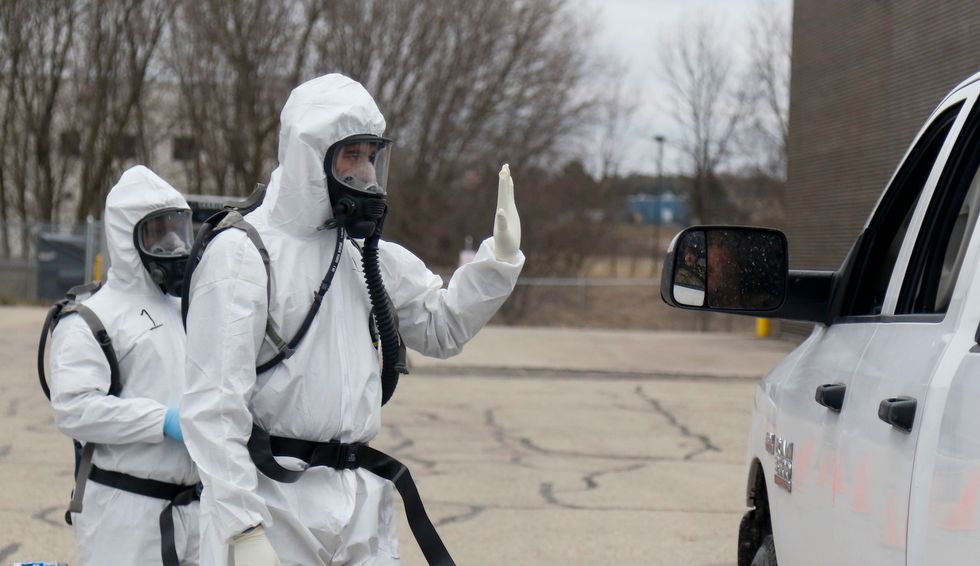President Donald Trump and his army of sycophants in the right-wing media have been asserting that the U.S. economy needs to reopen in early May, and many health experts have been warning that a premature end to social distancing could lead to thousands of preventable deaths. But even when stay-at-home orders are eventually lifted by individuals states, it is entirely possible that some Americans will continue to practice social distancing voluntarily just to be on the safe side — as the coronavirus pandemic might have a long-lasting impact on them psychologically. And Steven Taylor, a psychology professor at the University of British Columbia, is among those who believes that from a mental health standpoint, many people won’t be going back to normal anytime soon.
In an article for the Guardian, Taylor argues that the coronavirus pandemic could leave psychological scars on people all over the world. That trauma, according to Taylor, will be a form of PTSD: post-traumatic stress syndrome.
One need only take a look at figures reported by John Hopkins University in Baltimore to understand why Taylor predicts long-lasting coronavirus anxiety. As of early Friday morning, April 10, Hopkins was reporting that the pandemic had killed more than 97,000 people worldwide — including over 18,200 in Italy, 16,600 in the United States, 15,800 people in Spain and 12,200 in France.
“Based on the hallmarks of previous pandemics,” Taylor explains in The Guardian, “some of my predictions about coronavirus have proved eerily correct. I imagined that we’d see growing anxiety, racism, panic-buying, the proliferation of conspiracy theories, and sporadic instances of looting and theft — but also, altruism and generosity, as people reached out to the physically isolated with offers of help.”
Taylor notes that previous outbreaks, including the SARS epidemic, “suggest that a public health emergency can have lasting effects on the psychology of a population.” But COVID-19 has turned out be much deadlier than SARS, and Taylor points to “ongoing research” he has conducted with fellow psychologist Gordon Asmundson as an indication of how much PTSD the COVID-19 pandemic is likely to inflict in the months or years to come.
“While 75% of respondents seem to be coping well,” Taylor explains, “25% have developed what we’ve called COVID stress syndrome. These people have intense fears about becoming infected; they worry about the social and economic impact of COVID-19. They have coronavirus nightmares and persistently check the internet for news related to COVID-19, which may further heighten their anxieties.”
Taylor adds that research suggests that “10% of people affected by coronavirus — possibly more — will develop psychological disorders during or after this pandemic. And that includes those who haven’t actually been infected by COVID-19.
“It’s likely that even those who aren’t infected with coronavirus could also develop psychological symptoms,” Taylor asserts. “Isolation and confinement, even if only for a few weeks, can cause lasting anxiety. People quarantined for prolonged periods in cramped accommodation, sharing a bedroom with multiple occupants, or trapped at home in an abusive or coercive relationship, may be especially vulnerable to developing PTSD symptoms during and after the outbreak.”
The coronavirus crisis of 2020 has turned out to be the deadliest pandemic since the Spanish flu outbreak of 1918 more than 100 years ago. As deadly as the Spanish flu was, it didn’t bring an end to social gatherings in the United States; that pandemic was followed by the Roaring 1920s and the era of flappers, bootleggers, speakeasies, Al Capone, jazz bands and F. Scott Fitzgerald’s “The Great Gatsby.” The wild jazz parties depicted in various adaptions of “The Great Gatsby” were hardly an example of social distancing.
But technologically, much has changed since then. There was no internet in the late 1910s or the Roaring 1920s.
Taylor observes, “We’re living through the first global pandemic in the digital age, where the internet has made it possible to withdraw from the outside world…. Risk-averse, digitally connected people could continue retreating to the safety of home. As a result of COVID-19, some people will become fastidious germophobes, striving to avoid touching ‘contaminated’ surfaces or shaking hands.”
According to John Hopkins University, more than 1.6 million people have been infected with COVID-19 worldwide. And on Friday morning, April 10, that included 466,299 people in the U.S.
“The future implications of coronavirus are still uncertain,” Taylor notes. “But based on what we know from previous outbreaks, we can predict that this pandemic will have profound psychological effects on the people living through it.”


